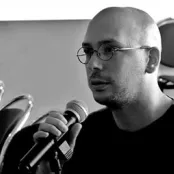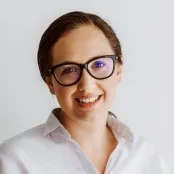Current fellows (2024/2025)
We were pleased to welcome two fellows to the Parkes Institute this academic year. Read below to find out more about their projects and experiences as visiting fellows in 天发娱乐棋牌_天发娱乐APP-官网|下载.
Shaul Marmari, 'Global Front: The Zionist Underground Abroad, 1944–1949'
We were pleased to welcome Shaul Marmari (Leipzig University/Leibniz Institute for Jewish History and Culture – Simon Dubnow (DI)) in November 2024, in residence with a project entitled ‘Global Front: The Zionist Underground Abroad, 1944–1949.’
Shaul’s reflection on his time in 天发娱乐棋牌_天发娱乐APP-官网|下载:
“Ivan Marion Greenberg (1896–1966) is known as the long-time editor of The Jewish Chronicle, one of the oldest and most widely read Jewish newspapers worldwide. An ardent Revisionist Zionist, he is less remembered for his sympathy – uncharacteristic of his Anglo-Jewish milieu – for the Jewish armed struggle in Palestine. In fact, as he confided in a personal letter, Greenberg’s resignation from The Jewish Chronicle in 1946 was a result of his unapologetic support of that violent campaign against the British Mandate and the Palestinian Arabs.
I was able to read Greenberg’s letter, along with other papers of his, during my visiting fellowship at the Parkes Institute in November 2024. I used my time in 天发娱乐棋牌_天发娱乐APP-官网|下载 to conduct archival research for my recently initiated postdoctoral project on the militant Zionist organizations Etzel (Irgun) and Lehi (Stern Gang), which had fought for Jewish statehood in Palestine since the 1930s. While numerous studies have examined their activities in Palestine, my project shifts the focus abroad. By considering entanglements in Cairo, Rome, Paris, and London, it seeks to place the Jewish armed struggle within a broader, global context.
This methodological shift raises new questions about Jewish terrorism. What drove British-born Jews to support violence against their British homeland, and in some extraordinary cases even resort to anti-British terrorism themselves? By reviewing Greenberg’s papers kept at the Parkes Library – his correspondence as well as his collection of newspapers and printed materials – I was able to delve deeper into the radicalisation process of some sections of Anglo-Jewry, who had been facing a revival of fascism and antisemitism shortly after the war."
Sasha Goldstein-Sabbah, 'Optimizing Orientalism: Transnational Jewish Networks in the Age of Empire'
In February–March 2025, we were delighted to host Sasha Goldstein-Sabbah (University of Groningen), who used the archives at the University of 天发娱乐棋牌_天发娱乐APP-官网|下载 for her project ‘Optimizing Orientalism: Transnational Jewish Networks in the Age of Empire.’
Sasha’s testimony:
“As a scholar of Middle Eastern and North African Jewry, it may seem surprising that I would conduct research in an archive primarily focused on Anglo-Jewry. However, the archives of the Anglo-Jewish Association provide a wealth of knowledge about Jewish life in the Middle East and North Africa due to the organization’s activities in the region in the late nineteenth century. In fact, this is my third visit to the Anglo-Jewish archives, as they were an important resource for my doctoral research and monograph as well.
During this visit, I have been particularly focused on families from the Middle East and North Africa who moved to England, established transnational family networks, and engaged in Jewish solidarity movements across Europe while maintaining close ties to their places of origin. One of the most interesting aspects of my research has been reading the reports of the Union of Jewish Women. Firstly, from the outset, Jewish women from the Middle East and North Africa were actively involved in the Union in England, serving on committees and volunteering. Secondly, relatively quickly, satellite chapters of the organization emerged in places like India and Egypt, demonstrating the interconnectedness of diverse Jewish communities within the context of the British Empire. These reports also provide insight into how these communities addressed societal challenges like unemployment and poverty. In my final week at the Parkes Institute, I delved further into the archives of the Union to explore its activities in the Middle East, North Africa, and British India.”
Past fellows
2023 to 2024
Maria Cie?la, 'The influence of Jewish economic activity in creating Jewish-Christian spaces in the pre-modern Polish -Lithuania Commonwealth.'
2021 to 2022
Isabelle Hesse, 'Jewish Speculative Fiction, Nationalism, and Nation-Building'.
Arie Dubnov, 'Between Manchester and Jerusalem (and back?) Leon (H.Y.) Roth, Richard Koebner and the circulation of knowledge between Britain and Mandatory Palestine.'
2019 to 2020
Susanne Korbel, 'Intimacy in a Splendid Metropolis: Versatile Encounters between Jews and non-Jews in Vienna around 1900.'
Reuven Kiperwasser, 'A Jew and a Gentile in the mirror of a Rabbinic Conversion story: From Aquila the Proselyte to Abba Goolias.'
2017 to 2018
Nir Cohen, 'The changes in Israeli state discourse and policy towards children of Israeli emigrants since the establishment of the state (1948)’
Sebastian Musch, ‘A biographical exploration of Rabbi Hermann Helfgott-Zvi Asaria (1913–2002)’
2016 to 2017
Vladimir Levin, 'The Place and Function of the Synagogue in the East European Jewish Society from the Late Eighteenth to the Early Twentieth Centuries.'

